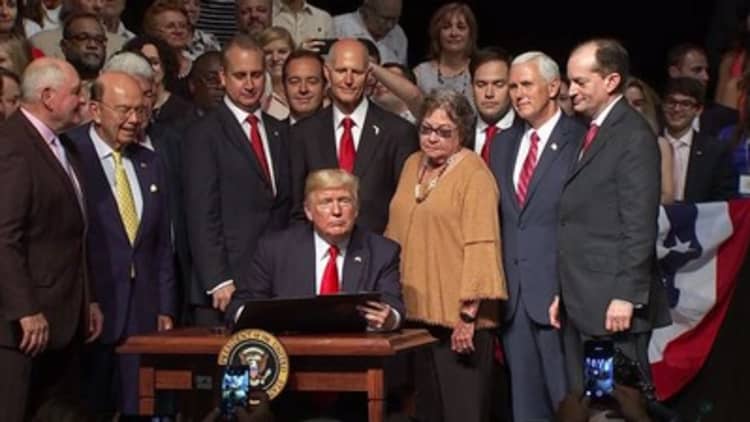Despite the hype, the travel industry will continue its expansion into Cuba, though the journey may be tougher for some.
President Donald Trump announced a policy shift on Friday that would prohibit solo trips to Cuba, but would allow group trips to continue. More than a year ago, former President Barack Obama loosened restrictions on travel to Cuba , allowing individuals and groups to go to the island nation for educational purposes.
One observer told CNBC on Tuesday that the change amounted to a clarification of existing policy.
"All the Trump administration is saying is, 'there's one thing we're going to change, and that is we're no longer going to permit individual travelers to purport to be traveling to Cuba under the education exemption,'" said Harry Clark, a partner at Orrick and chair of the law firm's international trade and compliance group.
The changes Trump announced will allow cruises and airlines to continue normal activity, but they could dampen hotel development plans. They could make traveling to Cuba more difficult for passengers, who would be subject to audit by the Treasury Department to ensure their trips to Cuba fall into one of the 12 acceptable purposes.
The full scope of the new policy remains to be seen, as the Treasury and Commerce Departments will release precise regulations within 30 days. Still, Carnival, Royal Caribbean and Norwegian cruise lines expressed satisfaction that Trump's policy will allow them to continue sailing to Cuba.

United and Alaska airlines said in statements that they are assessing policy changes to see what affect they would have on passengers. Delta, JetBlue and American will adhere to new changes and will continue to fly their regular flights to Cuba, they said in statements.
However, Marriott International's planned operations in Cuba may depend on the Trump administration's regulations, the hotel company said in a statement. It has invested "significant resources" to open one hotel, and plan another that's in the works.
"More importantly, as Cuba moves to reform its economy in the post-Castro era, American businesses should be present to lead by example," Marriott's statement said.
"We will continue to urge the Trump Administration and Congress to recognize and utilize travel as a strategic tool in efforts to improve relations with Cuba, allowing us to be part of a promising future, as opposed to reverting to the policies of the past."
Steven Zelkowitz, the managing shareholder and co-chair at the hospitality industry group at GrayRobinson law firm, thinks hotel development in Cuba will decrease because of Trump's policy. In his view, it prevents U.S. companies from conducting business with companies controlled by the Cuban military.
That could be difficult for developers, Zelkowitz said, since the military's control over the economy is so pervasive.
"There are so many other opportunities in so many other countries that are easier to deal with government and infrastructure that (hotel companies) will look to those opportunities first," said Zelkowitz, whose firm represents hotel companies such as Solé and Marriott.
Solé was considering opening a Cuban property, but changed its mind because of the policy changes, Zelkowitz said. He added others could follow suit.


